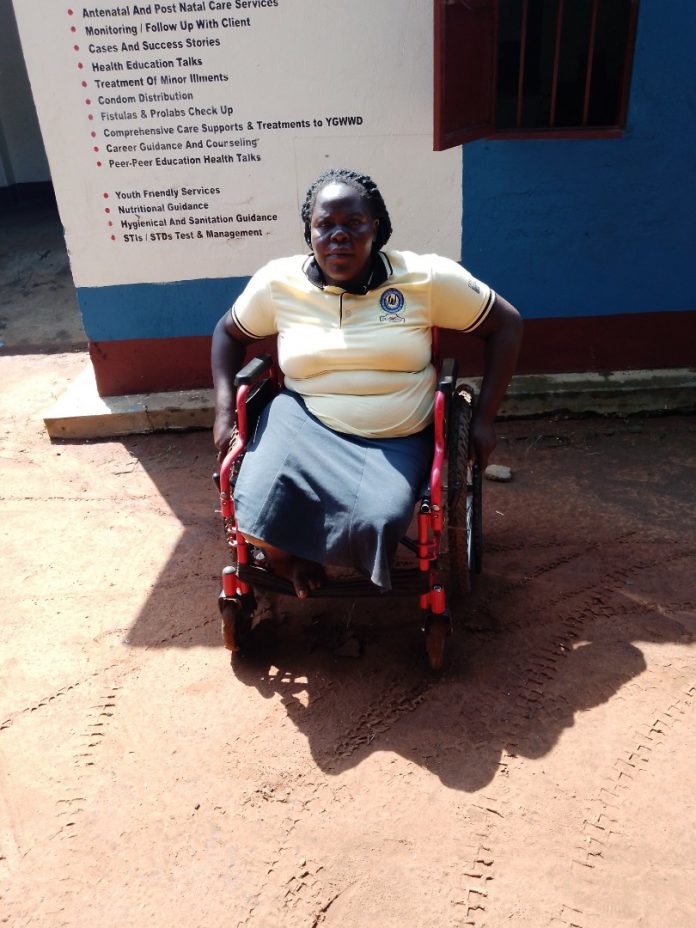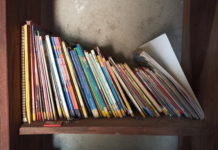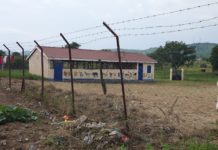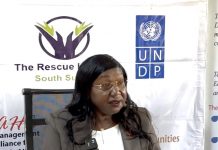By: Okello Jesus, Speak FM
Although a number of women living with disabilities bear children, little or nothing at all is being done to provide basic prenatal health services to such women and worse in the remote rural settings of Northern Uganda’s Acholi sub region.
For many women living with disabilities in Acholi sub region, accessing maternal health care remains a nightmare. This is curved out of stigma, discrimination, negligence, ignorance and inaccessible health facilities’ equipment.
This however has combined to make it very difficult for women living with disabilities to receive safe childbearing and child care assistance both from the health facilities and the communities thus forcing many of them to have unsafe birth and this leads to maternal death and other maternal health related problems.
Nighty Akwero, a resident of Patwol ward in Nwoya district’s Anaka town among the many women in the rural setups of Acholi sub region was struck by polio at a tender age but today, she is a happy mother of five. She had her first delivery on the floor of Anaka General Hospital on 23/03/2006 while she was in Anaka camp since she cannot manage to climb the high delivery bed.
In pain, Nighty trekked to Anaka General Hospital which is over 2 miles away from her home and yet to be welcomed by discriminative health workers who subjected her to all sorts of odd questions and insults from the medical workers.
“The nurse left me on the floor and when to do her things, and I struggled to safely deliver my first son. By God’s grace, I safely delivered it on the floor without any assistance from the midwife.” Nighty laments.
With tears rolling down her chin, Nighty narrates her sad story and disclosed that the midwife shouted at her saying why did you deliver alone? Do you want me to lose my job? While insulting her with words like Why do you want to give birth if you know that you are disabled?
Struggling to hold back her tears, she revealed that with her second delivery, she went for antenatal, no one attended to her.
“I went to the hospital, no one attended to me and a doctor from Gulu was the one who worked on me. In that same year, I went for delivery at the hospital, they say climb up the delivery bed, I cannot climb the bed, I silently picked and laid my plastic
delivery mat on the floor and delivered from there. And my caretaker started arranging my belongings.”
“The midwife came and I had delivered, she wanted to inject me to control blood flow. She wanted to inject my lamed right leg, I told her that since childhood, this leg has never been injected. She furiously asked, where do you want me to inject? Turn that leg here! And I silently turned my leg to her.”
Mary Atim Ladwong, In Charge maternity ward Anaka hospital disclosed that the hospital offers the required maternal health services to both women living with disabilities and abled women. She noted that many health workers have different attitudes and if any woman living with disability was treated badly then this has not happened during her leadership as In charge maternity ward Anaka hospital.
“These mothers when they come for antenatal care and services like ANC examination and we have challenge with handling the deaf and dumb when they come for the services, sometimes if they do not come with their helper, it is very hard to give them services.” Added Atim.
“We also have one major problem with sign language and also there is no special bed for the lame and we have only one bed for women living with disabilities which was given to us by one of our partners. We used to use wooden steps as a supportive tool for disabled women to climb on to the delivery beds and the rest bed after delivery before the partner came to our aid.” Disclosed Atim.
She further disclosed that the maternity ward has a wash room nearer to the delivery room which has the one special bed for the women living with disabilities but they do not have special beds in the rest room for women living with disabilities.
“Since my posting here, I have delivered three women living with disabilities who had physical disabilities but were able to climb the high delivery beds,” Atim further disclosed.
Joyce Auma, a woman living with disability in Gulu city disclosed that they faced numerous challenges when it comes to access to maternal health care in the different facilities in the city. She noted that she really tried very much to reach a nearby facility during her first trimester but she was treated badly.
“A midwife says to me to climb that bed or deliver on the floor as if I have the legs to climb up the high delivery bed,” disclosed Auma.
Concy Apiyo, a mother of two children who has also lost both legs to landmines in the early 2000’s disclosed that during her first birth in May.24th. 2014, in Anaka Hospital, she experienced great difficulties and she had to go through an operation which was not easy.
“I have one major challenge that prevents me from going to that hospital to deliver again, we share one latrine and shelter with abled people and for me who have no legs and I usually find it hard to crawl on the shelter’s floor to ease myself.”
“Giving birth to my second baby was not that hard but I also had to go through an operation which was successfully done on 27th.May 2019 from St. Mary’s Hospital Lacor in Gulu city, but my fellow disabled women face a lot of challenges especially harassment from health workers and also mobility problems.”
“One of my friends told me that one health worker mocked her, and insulted her during her delivery from the health facility. She asked me to climb the high delivery bed yet I have no legs. The Midwife asked me, how did you climb that bed while enjoying the man? You climb here the way you climb that bed?”
She however further disclosed to me that apart from the numerous insults and harassments, they are also challenged with the unfair public transport means which usually do not favor them.
Margret Auma, a woman living with disability and a widow with hearing problems in Patwol village, Palaro parish, Palaro Sub county in Gulu district and a mother of four children disclosed that she finds it very hard to move to the health centers to receive medical services.
“I have a problem with long distances to the health facilities and also I have no money to pay for transport fares from my home since they charge us high prices, especially us with hearing problems. To make matters worse, I have to spend the little profits that I get from selling these green vegetables and food stuff I sell here at this Palaro local market.” Disclosed Auma.
Even the health workers do not respond to us on time, they wait when you are struggling in labor pain and they come to your rescue. They normally refer us to other facilities yet we may not have the transport money to these distant health facilities, Concy narrates her sad story.
“My husband is no more, he left me alone and I am taking care of these three children who are still alive single -handedly but unfortunately one died; struggling to put food on the table is even very hard for me since sometimes I come back home empty handed with no money.”
Christine Aciro, a 49 years old mother of four children and a resident of Pader district disclosed that she also finds a lot of challenges with the mobility problem.
“I was confronted by one midwife during my fourth delivery with harassment and insults. She says, woman do you still want to give birth at this age?” What for? Can you see that you are a woman living with a disability who should not give birth to many children. But I had made out my mind to have four children and this was my last child.” Christine disclosed.
Clare Joyce Ajok, a midwife at Oroko health center II in Gulu district disclosed that women living with disabilities face a lot of challenges right from conception till childbirth and also some health workers have negative attitudes towards women living with disabilities.
“Some disabled mothers fear to come to the facility for maternal health services because of stigma, and even some health workers neglect the disabled women who come for maternal services. During delivery, our delivery beds are also not friendly to women living with disabilities and we sometimes use supportive stands to help these mothers.”
“We have a challenge with sign language interpretation to help us communicate to persons with hearing impairment. We therefore appeal to the government to equip health workers with the skills and knowledge of sign language interpretations. If possible, the government should organize training in sign language for us.”
Monica Akello, a midwife in charge of maternity ward Awach health center IV in Gulu District disclosed that none of these mothers with disability comes to the health center for antenatal visits because of many reasons they are facing in the community.
“None of these disabled women reaches the 8 antenatal visits as required by the Ministry of Health and the World Health Organization. There is also no special care given to these disabled women like special delivery beds, special rest beds after delivery among other things. We therefore request the government to provide adjustable beds which can be adjusted up to the ground so that women living with disabilities can climb and safely deliver on the bed, not on the floor, which is not good for the health of the baby and the mothers.”
Annet Aber, midwife In Charge maternity ward at Bar – Dege Health Center III noted that the relationship between the health workers and women living with disabilities are at stake since they do not know how to communicate to these women living with disabilities especially those who cannot hear.
“Giving them health education is very hard especially for the deaf and it is also very hard for them to share with us their problems and for us to give them the full health packages as required by the ministry. Government should train us in sign language interpretations.”
While at Bar – Dege Health Center III, I observed that though the entrance to the maternity ward has a ramp that can enable access to the ward for persons with disabilities, the waiting place has high benches which are inaccessible by persons with disabilities. The health center has 3 delivery beds with only 2 in good working conditions and 5 rest beds for mothers after delivery with only 4 in good working conditions and I must admit that the midwives at the maternity ward of the health center handled pregnant mothers with smile and jokes that make expectant mothers feel the joy of motherhood.
Eunice Oyella, a midwife at Langol health center III disclosed that some women living with disabilities lack essential materials and assets that could help them right from conception to giving birth.
“One of them told me that it is hard for her to get the necessities to enable them access better maternal health services. She says she cannot afford materials like basins, children’s clothing among other essential materials in these government health centers.”
“We wish the government and well – wishers to come in and support these women living with disabilities with materials like basins, clothing and other essentials just right from the time these women conceived, during their visits until delivery even after birth services.”
Florence Auma, In charge Gulu Women With Disabilities’ Health unit disclosed that they usually talk to women living with disabilities to go and stay near the health facilities when they feel that their delivery is due.
“But these women normally complain bitterly about the attitude of health workers towards them and one said this to her, “They insult us. They harassed us.”
She added that some health workers do not know how to talk to these women in a polite way. Sometimes, a woman living with disability who has no legs and crawls to the health facility may reach while her clothes are dirty and these health workers shout at them with silly questions.
“Why do you come to the health center with that dirty cloth and hands? Go home and wash your clothes then you come for health services.”
“I appeal to the health workers in all the facilities to love their work and respect all persons equally regardless of whether the person is woman living with disability or not,” she added.
However, as they go to community sensitizations, persons living with disabilities are not taken as individuals who have a say in the community right from the family. It is worse among men who value women living with disabilities only during night but not day time.
“You hear them saying, I have four children and that thing while pointing at the child living with disability.” Added Auma.
She added that men used these women living with disabilities only at night and once they impregnate the woman, they do not want to take responsibility and to make matters worse, if the woman tested and found out that she has been infected with HIV and report to the man, he furiously levied the blame on the woman living with disability for infecting him with HIV yet the man could have been the one who infected the woman.
“There is even this dangerous myth in Acholi that if a positive HIV man have sexual intercourse with a woman living with disability, the HIV will get cured. My people, let’s stay away from this myth. It is not true, let’s stop harassing and abusing women living with disabilities.” Added Florence.
Teddy Aciro Luwa, Chairperson Gulu Women with Disabilities Union and in charge of all women living with disabilities in the Acholi sub region disclosed that the union is doing continuous advocacy for the rights of women living with disabilities in Acholi sub region but they have been confronted with numerous challenges.
“Some health workers judge women living with disabilities through their appearance when our fellow women visit the facility and they treat us differently as compared to other women.” She disclosed.
“We are also doing continuous advocacy for adjustable beds at the different health facilities within Acholi sub region especially in the five districts of Gulu, Amuru, Nwoya, Omoro and Gulu city that we are currently fully operating but we have coordination offices in the East Acholi for the districts of Kitgum, Agago, Lamwo and Pader and also working round the clock to extend our services in the West Nile region if we get more funding.” noted Teddy.
On the same note, Teddy disclosed that though the government thinks women living with disabilities are okay and living equally in the community, the situations are really unbearable for many and there is still a lot that needs to be done so as disabled women live a happy and equal life in the community.
She further disclosed that the union brings together 500 members from each of the five districts of Gulu city, Gulu district, Amuru, Omoro and Nwoya district but the union serves the entire Acholi sub region with the current statistics of over 8000 women living with disabilities who are being supported by the union.
Lakwonyero Denish Ocen, Councilor V representing persons with Disabilities at Gulu district local government urges the communities to come out and start advocating for equal treatment of persons with disabilities within the district and region at large.
“We have to come out as a team, all stakeholders and implementing partners, let’s support this common course to see that we people with disabilities receive equal treatment both at the health centers and in the community.”
“It is very sad to see a woman living with disability dying during delivering, hearing that a woman living with disability is raped, being evicted from her own land and marriage. Together we can make a difference, let’s start today not tomorrow.”
Patrick Ojok, the project coordinator Gulu Disabled Persons Union disclosed that a baseline survey conducted in December 2009 in Kamuli district, 78 percent of the women interviewed said they avoided going to health units for maternal health care and this also applies to Northern Uganda.
“We see women living with disabilities in the rural areas of Acholi sub region struggling to safely give birth. We community members should change our negative perceptions on persons with disabilities. We are all equal.”
Ojok noted that for those with hearing impairments, getting care is even harder because health care workers in many cases don’t understand sign language, we are urging you to come to the union and get sign language interpretation skills and knowledge.
“All stakeholders including government and local leaders, let us interest ourselves in training the local community and sensitize them about maternal and reproductive as well as join hands in advocating for favorable services in health units.”
Mr. Yoweri Idiba, the acting Gulu district Health Officer during 2gether4SRHR program district closeout/Learning meeting held on 26.04.2022 that the institutional maternal mortality ratio stands at 249 per 100,000 Live birth, with low antenatal attendance within the first trimester of 32% hence it is difficult to complete ANC 4th visits (62%) and up to the 8th visits.
Idiba disclosed these figures are alarming and teenage pregnancy accounts for 27% of all ANC and 11 out of 32 maternal deaths are teenagers. He added that persons with disabilities ANC attendance is very low among disabled women in the rural areas of Acholi sub region.
“Quarterly we see the rise in the reported maternal health deaths in the Acholi sub region but there is still not enough that we are doing, therefore I called upon all stakeholders to join hands and see that the numbers of maternal deaths go down and also work towards improving on the ANC visits especially for women living with disabilities.” added Idiba.
In 2010, CEHURD, under the Regional Network for Equity in Health in East and Southern Africa (EQUINET) conducted a desk review of the constitutional provisions on the right to health in fourteen countries in the region (Mulumba et al.,2010) which include Uganda.
The organization found out that the Government of Uganda (GoU) decentralized its health system as a way of empowering its citizens to participate in the process of development and improve their livelihood in critical sectors such as health and this decentralization of health services created two levels of health sector administration, one at the central government and the second as local government.
Though the Government Health Policy states that health centre IIs are supposed to be in every parish, this is largely not the case because most parishes have no health centres II which were meant to do referrals to Health Centre IIIs, which are meant to be in every sub county and health centre IVs serve counties and are mini hospitals which should have the capacity to admit patients and conduct surgery under the care of senior medical officers. However, many of them are non-functional units due to the lack of beds, water and electricity.





